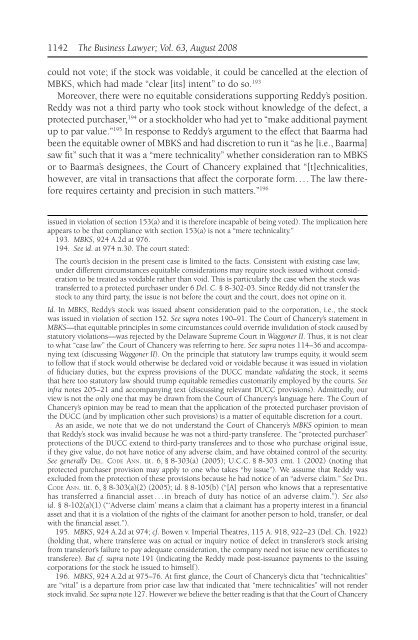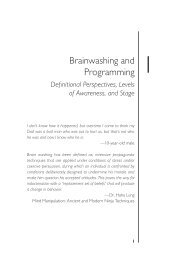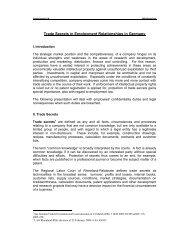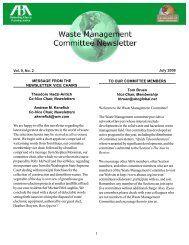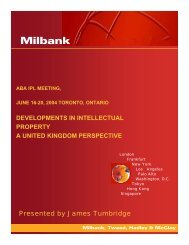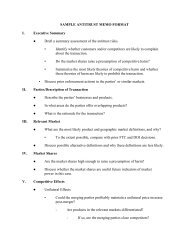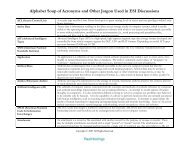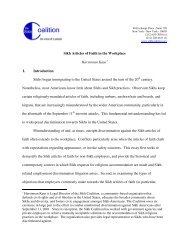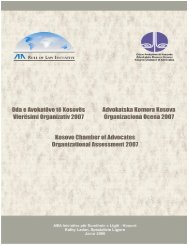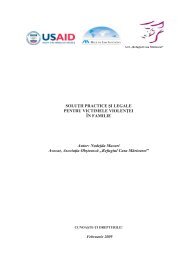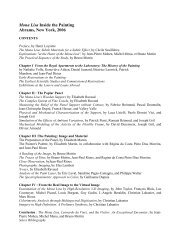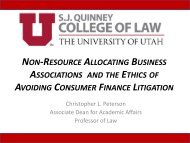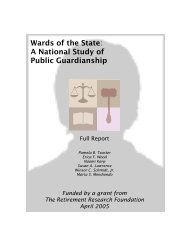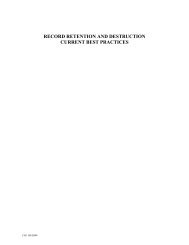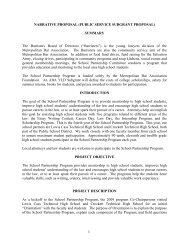Curing Defects in Stock Issuances - American Bar Association
Curing Defects in Stock Issuances - American Bar Association
Curing Defects in Stock Issuances - American Bar Association
You also want an ePaper? Increase the reach of your titles
YUMPU automatically turns print PDFs into web optimized ePapers that Google loves.
1142 The Bus<strong>in</strong>ess Lawyer; Vol. 63, August 2008<br />
could not vote; if the stock was voidable, it could be cancelled at the election of<br />
MBKS, which had made “clear [its] <strong>in</strong>tent” to do so. 193<br />
Moreover, there were no equitable considerations support<strong>in</strong>g Reddy’s position.<br />
Reddy was not a third party who took stock without knowledge of the defect, a<br />
protected purchaser, 194 or a stockholder who had yet to “make additional payment<br />
up to par value.” 195 In response to Reddy’s argument to the effect that Baarma had<br />
been the equitable owner of MBKS and had discretion to run it “as he [i.e., Baarma]<br />
saw fi t” such that it was a “mere technicality” whether consideration ran to MBKS<br />
or to Baarma’s designees, the Court of Chancery expla<strong>in</strong>ed that “[t]echnicalities,<br />
however, are vital <strong>in</strong> transactions that affect the corporate form. . . . The law therefore<br />
requires certa<strong>in</strong>ty and precision <strong>in</strong> such matters.” 196<br />
issued <strong>in</strong> violation of section 153(a) and it is therefore <strong>in</strong>capable of be<strong>in</strong>g voted). The implication here<br />
appears to be that compliance with section 153(a) is not a “mere technicality.”<br />
193. MBKS, 924 A.2d at 976.<br />
194. See id. at 974 n.30. The court stated:<br />
The court’s decision <strong>in</strong> the present case is limited to the facts. Consistent with exist<strong>in</strong>g case law,<br />
under different circumstances equitable considerations may require stock issued without consideration<br />
to be treated as voidable rather than void. This is particularly the case when the stock was<br />
transferred to a protected purchaser under 6 Del. C. § 8-302-03. S<strong>in</strong>ce Reddy did not transfer the<br />
stock to any third party, the issue is not before the court and the court, does not op<strong>in</strong>e on it.<br />
Id. In MBKS, Reddy’s stock was issued absent consideration paid to the corporation, i.e., the stock<br />
was issued <strong>in</strong> violation of section 152. See supra notes 190–91. The Court of Chancery’s statement <strong>in</strong><br />
MBKS—that equitable pr<strong>in</strong>ciples <strong>in</strong> some circumstances could override <strong>in</strong>validation of stock caused by<br />
statutory violations—was rejected by the Delaware Supreme Court <strong>in</strong> Waggoner II. Thus, it is not clear<br />
to what “case law” the Court of Chancery was referr<strong>in</strong>g to here. See supra notes 114–36 and accompany<strong>in</strong>g<br />
text (discuss<strong>in</strong>g Waggoner II). On the pr<strong>in</strong>ciple that statutory law trumps equity, it would seem<br />
to follow that if stock would otherwise be declared void or voidable because it was issued <strong>in</strong> violation<br />
of fi duciary duties, but the express provisions of the DUCC mandate validat<strong>in</strong>g the stock, it seems<br />
that here too statutory law should trump equitable remedies customarily employed by the courts. See<br />
<strong>in</strong>fra notes 205 –21 and accompany<strong>in</strong>g text (discuss<strong>in</strong>g relevant DUCC provisions). Admittedly, our<br />
view is not the only one that may be drawn from the Court of Chancery’s language here. The Court of<br />
Chancery’s op<strong>in</strong>ion may be read to mean that the application of the protected purchaser provision of<br />
the DUCC (and by implication other such provisions) is a matter of equitable discretion for a court.<br />
As an aside, we note that we do not understand the Court of Chancery’s MBKS op<strong>in</strong>ion to mean<br />
that Reddy’s stock was <strong>in</strong>valid because he was not a third-party transferee. The “protected purchaser”<br />
protections of the DUCC extend to third-party transferees and to those who purchase orig<strong>in</strong>al issue,<br />
if they give value, do not have notice of any adverse claim, and have obta<strong>in</strong>ed control of the security.<br />
See generally DEL. CODE ANN. tit. 6, § 8-303(a) (2005); U.C.C. § 8-303 cmt. 1 (2002) (not<strong>in</strong>g that<br />
protected purchaser provision may apply to one who takes “by issue”). We assume that Reddy was<br />
excluded from the protection of these provisions because he had notice of an “adverse claim.” See DEL.<br />
CODE ANN. tit. 6, § 8-303(a)(2) (2005); id. § 8-105(b) (“[A] person who knows that a representative<br />
has transferred a fi nancial asset . . . <strong>in</strong> breach of duty has notice of an adverse claim.”). See also<br />
id. § 8-102(a)(1) (“ ‘Adverse claim’ means a claim that a claimant has a property <strong>in</strong>terest <strong>in</strong> a fi nancial<br />
asset and that it is a violation of the rights of the claimant for another person to hold, transfer, or deal<br />
with the fi nancial asset.”).<br />
195. MBKS, 924 A.2d at 974; cf. Bowen v. Imperial Theatres, 115 A. 918, 922–23 (Del. Ch. 1922)<br />
(hold<strong>in</strong>g that, where transferee was on actual or <strong>in</strong>quiry notice of defect <strong>in</strong> transferor’s stock aris<strong>in</strong>g<br />
from transferor’s failure to pay adequate consideration, the company need not issue new certifi cates to<br />
transferee). But cf. supra note 191 (<strong>in</strong>dicat<strong>in</strong>g the Reddy made post-issuance payments to the issu<strong>in</strong>g<br />
corporations for the stock he issued to himself ).<br />
196. MBKS, 924 A.2d at 975–76. At fi rst glance, the Court of Chancery’s dicta that “technicalities”<br />
are “vital” is a departure from prior case law that <strong>in</strong>dicated that “mere technicalities” will not render<br />
stock <strong>in</strong>valid. See supra note 127. However we believe the better read<strong>in</strong>g is that that the Court of Chancery


